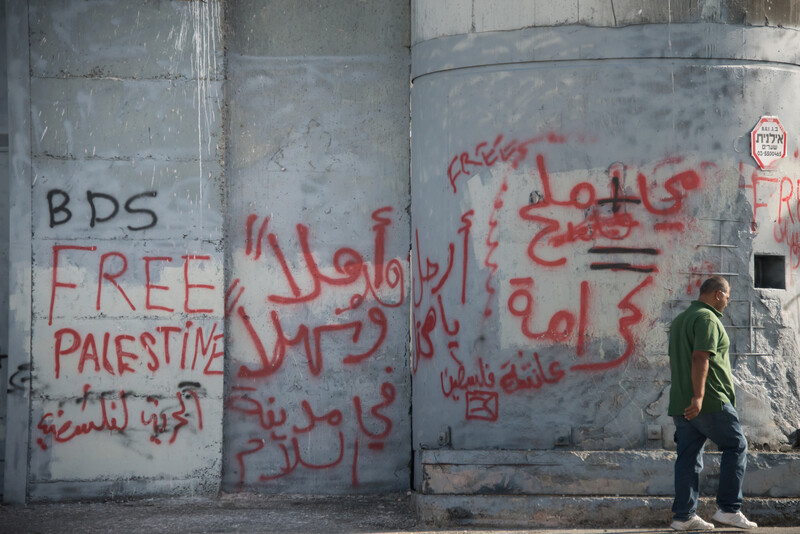Lobby Watch 27 September 2018

Graffiti on the Israeli-built wall dividing the occupied West Bank city of Bethlehem promotes the BDS — boycott, divestment and sanctions — movement.
ActiveStillsA professor has received death threats after rescinding an offer to write a recommendation for a student who wished to participate in a study abroad in Israel program.
John Cheney-Lippold, who researches privacy and digital media at the University of Michigan, said he declined to write the recommendation because he supports the Palestinian call for an academic boycott of Israeli institutions.
“I wouldn’t cross a union picket line and I can’t cross this one,” he said.
Israel lobby groups charge that Cheney-Lippold’s choice is an act of discrimination and anti-Semitism.
Cheney-Lippold also “received threats that he’ll be scooped up off the street and thrown out of a helicopter, like military juntas did to leftists in South America during the dirty war,” said Radhika Sainath of civil rights group Palestine Legal, who is advising the professor.
“He received a threat that he’ll be gunned down or blown up while walking down the street,” she told The Electronic Intifada, adding that it has taken a physical and emotional toll on him.
The university’s president, Mark Schlissel, issued a statement last week condemning Cheney-Lippold’s position and reiterating that the administration “strongly opposes a boycott of Israeli academic institutions.”
The Palestinian-led boycott, divestment and sanctions (BDS) campaign has called on academics around the world to shun links with Israeli institutions that are complicit in Israel’s violations of Palestinian rights through colonizing occupied Palestinian land, supporting Israeli military assaults on Gaza, extensive participation in weapons research and discrimination.
Schlissel admonished the professor for allowing the interference of “personal views and politics,” but has not yet commented on the death threats Cheney-Lippold has received, nor indicated that the university will investigate the threats and protect him.
The Electronic Intifada asked the university about the president’s planned response to the threats. A spokesperson replied that “as a matter of policy, we do not discuss personnel matter publicly.”
The president has previously defended advocacy of political views on campus.
In 2016, Schlissel defended Palestinian rights activists against accusations that a protest against Israeli policies – held on the same day as a Jewish holiday – was an affront to Jewish students.
Schlissel told the campus newspaper at the time that the Palestinian rights activists “did what we want advocacy groups to do, and to me, they were advocating a political point of view.”
In an apparent effort by the university to appease Israel advocates, an advisory committee declared on Tuesday that “a student’s merit” must be “the primary guide for determining how and when to provide letters of recommendation.”
Propaganda effort
The study abroad in Israel programs are part of an Israeli propaganda effort “designed to give international students a ‘positive experience’ of Israel, whitewashing its occupation and denial of Palestinian rights,” according to the Palestinian Campaign for the Academic and Cultural Boycott of Israel (PACBI).
They also violate equal rights clauses because Israel regularly denies entry to persons because of their Arab, Middle Eastern, or Muslim ancestry.
Israel’s racial profiling has a “discriminatory impact on students participating in educational programs,” while the 2017 passage of its anti-BDS law “means that US students could be prohibited entry into the country for an act of political expression that is fully protected under the US Constitution,” warned the US Campaign for the Academic and Cultural Boycott of Israel (USACBI).
The group recently launched a call to students and educators not to support or participate in Israel study abroad programs.
Students Allied for Freedom and Equality (SAFE) at the University of Michigan, which led a successful divestment resolution to probe Israel investments in 2017, says its members “support and affirm Professor John Cheney-Lippold’s right to boycott Israel.”
To punish professor Cheney-Lippold “for his actions would curtail his own academic agency,” the students say.
They add that “whatever inconveniences” the student may face in securing a recommendation letter, she “will undoubtedly be able to visit, study and work in the country” while “Palestinian students and their allies continue to be blacklisted, targeted and exiled from their home country for their identities.”
“Palestinian students do not have the privilege of going back to Palestine, much less studying abroad. Where is the concern for their educational opportunities?” the students ask.
Notably, despite university president Schlissel’s condemnation of Cheney-Lippold’s decision, it is already University of Michigan policy to discourage students and faculty from traveling to Israel.
The university has issued a warning that travel there “for university purposes is unadvisable due to a significant level of health, safety or security risks.” Travel to Israel is still permitted however as long as students and faculty follow certain precautionary guidelines.
But the university has issued an even more severe “restriction” on travel to the occupied West Bank and Gaza Strip – which means that undergraduates are completely prohibited from traveling there for university work.
Graduates students and faculty may only go to those territories under strict conditions.
While listing numerous study abroad programs in Israel, the University of Michigan offers none in Palestinian universities.
This means, in effect, that Israel – the occupying power – retains the benefit and privilege of academic links with the University of Michigan, while Palestinian universities under Israeli military occupation are denied such ties.
Silencing campaign
Along with Schlissel’s remarks, a member of the university’s governing body also labeled the professor’s decision “anti-Semitic” and claimed his choice not to support the student’s “educational aspirations” to study in Tel Aviv went against the university’s values.
The condemnations from university officials echoed those of major Israel lobby groups intent on thwarting Palestinian rights campaigns on US campuses.
Nearly 60 anti-Palestinian organizations, right-wing watchdogs and Israel propaganda groups, including the Amcha Initiative, StandWithUs, the Lawfare Project and the Simon Wiesenthal Center, have called for Cheney-Lippold to be sanctioned “to the fullest extent of university policy” for alleged “discriminatory behavior.”
While the groups conceded that members of faculty “have the right to express public support for an academic boycott of Israel,” they say that faculty who “go as far as implementing” the boycott have “abrogated” their professional responsibility toward students’ academic welfare.
The director of the Endowment for Middle East Truth, an Israel lobby organization known for its role in perpetuating anti-Muslim propaganda, also called Cheney-Lippold’s decision not to write the letter “simply an anti-Semitic act” that was “discriminatory” against Jewish and pro-Israel students.
The executive director of Club Z, an organization that promotes Zionism, Israel’s state ideology, among teenagers, also claimed Cheney-Lippold’s choice was “anti-Semitic” because the student’s destination was Israel.
Jonathan Greenblatt, CEO of the Anti-Defamation League, a right-wing Israel lobby group that masquerades as a civil rights organization, said that Cheney-Lippold’s decision was “not acceptable” and accused the professor of victimizing the student with his “political bias.”
Greenblatt also called on the university to publicly condemn the academic boycott of Israel – something its president has already done.
Accusing professors of anti-Semitism and discrimination against Jewish students when no actual anti-Jewish bigotry has taken place is hardly a new tactic, but the Trump administration has broadened a way Israel advocates can use such accusations to shut down activism for Palestinian rights.Kenneth Marcus, a longtime Israel lobbyist who now leads the Department of Education’s Office for Civil Rights, recently announced to the Zionist Organization of America that he will apply standards that conflate criticism of Israel and Zionism with anti-Jewish bigotry when adjudicating complaints filed with his department.
“Trump’s and Marcus’ objective is to make it too costly for people to support Palestinian freedom,” Sainath explained.
Sainath said that the relentless targeting of the professor by Israel lobby groups shows that their strategy is to “silence anyone who takes a principled stance” for Palestinian rights.
“The tide is turning, they can’t win their case for apartheid on the merits – so they’re pursuing a campaign of intimidation and censorship,” she added.
“Wouldn’t cross a picket line”
Despite the threats and smears, Cheney-Lippold has stood by his decision.
He said that he supports the Palestinian call for an academic boycott “because I am appalled at Israel’s continuing violation of Palestinian rights, and our government’s support for those violations.”
If a student had wanted to do a study abroad program at an institution in South Africa under apartheid, he explained, “I would have declined to write a letter for her as well.”
Members of USACBI say that Cheney-Lippold’s decision “affirms an ethical position increasingly shared by artists, musicians, actors, scholars and students around the world who have endorsed the Palestinian call for an academic and cultural boycott of Israel.”
“A letter of recommendation is not a right but is written at the discretion of faculty members,” USACBI members stated in a open letter of support for Cheney-Lippold.
“Professors, like any other individual, are entitled to hold firm positions on a matter of conscience and act in regard with those principles,” they added.
More than 700 Palestinian rights supporters have signed a petition backing Cheney-Lippold.
Michigan is one of 25 US states that have passed measures intended to restrict BDS campaigning.
Michigan’s two anti-BDS laws, which Palestine Legal calls unconstitutional, apply to narrowly defined state procurement and construction contracts, not professors or an academic boycott.
Ali Abunimah contributed reporting.






Comments
Israel
Permalink Gennaro Pasquale replied on
Israel is an apartheid State and the only state that claims it is a democracy while admitting that it does not belong to its citizens but belongs to Jewish people around the world. That is racism
another hour of truth on campus
Permalink tom hall replied on
Elsewhere today on this very site readers will find an eloquent essay by Sarah Algherbawi on the wanton destruction through Israeli military bombing of Gaza's Said al-Mishal Cultural Center. Yet there are Americans who want to strengthen institutional ties with the perpetrator of this crime and intensify the burden of strictures under which Palestinian artists and scholars live and all too frequently die. It is a profanation of everything academic life ought to embody, to maintain programs of exchange with an apartheid regime which blows up Palestinian schools, shoots Palestinian students, starves Palestinian institutions of funding, jails professors, prevents Palestinian scholars and students from traveling abroad, arbitrarily blocks physical access to school facilities, shuts down universities, sprays children and their classrooms with noxious skunk water, and denounces the Palestinian national curriculum as an incubator of terrorism.
No American teacher and no American student should have to participate in propaganda exercises of the type at which John Cheney-Lippold has demurred. University management- and that's what they are, managers not administrators- will not defend the core values of education because they neither believe in nor understand those values. They have long ago accepted a neoliberal basis for the field of education as a latter-day intellectual plantation devoted to generating profits for business consortia while suppressing currents of thought and action critical of that desolating purpose. But we must do what we can as citizens and persons of conscience to raise our voices in defense of Cheney-Lippold and others facing this sort of predicament. As is so often the case, a single example of this type stands for an entire class of such incidents.